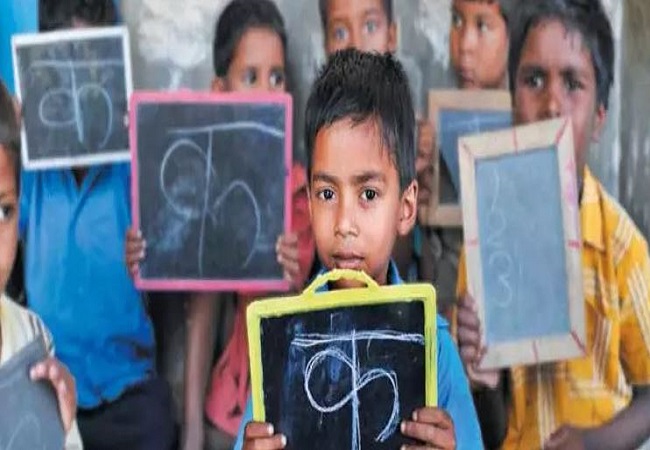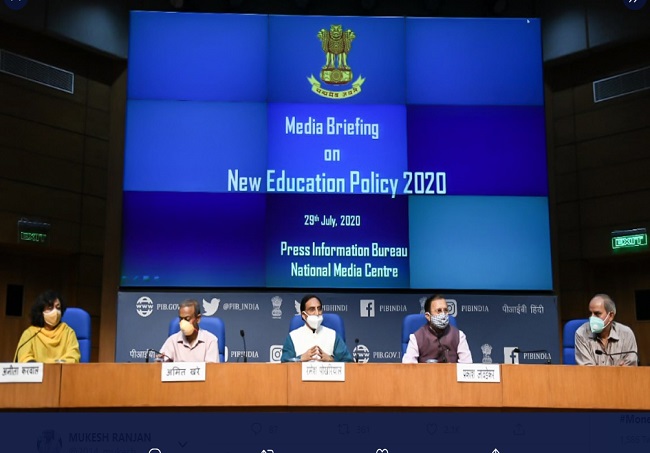
Budget 2020-21: Govt announces Rs 99,300 crores for education sector
The NEP 2020 misses the fundamental goal of human development and expansion of knowledge.
The National Education Policy, 2020 (NEP 2020) which aimed to pave the way for transformational reforms in “school and higher education” is high on catchwords, gloss, appearance and verbosity yet lacks (i) a coherent implementational roadmap and strategy, (ii) clearly defined milestones and (iii) the critical finances necessary to execute this grand vision.

Consultation, Discussion, Deliberation, Transparency Circumvented
The timing of the NEP 2020 in the middle of the Corona Pandemic when all educational institutions are closed is, in and of itself, questionable. More so when almost the entire academia has complained of no consultation, no discussion and no deliberations, except with BJP-RSS affiliates. On a policy that impacts and affects our present and future generations, even Parliamentary oversight has been circumvented. Contrast this with the rigorous parliamentary and widespread consultation that preceded the Right to Education Act.

Public Spending on Education = Mismatch of Promise versus Delivery
The transformation of school and higher education, multiplicity of ideas and the professed multi-disciplinary approach requires Finances. NEP 2020 recommends spending 6% of GDP on education. However, spending on education as a percentage of the budget, has fallen from 4.14% in 2014-15 to 3.2% in 2020-21 under the BJP Government. Even this budgeted amount will see a cut of 40% owing to the Corona pandemic in the current year taking the education spending to (close to) 2% of the total budget. There is thus a huge mismatch between promise and delivery with no clarity on whether NEP 2020 proposes financing of 6% of GDP to come from public funds or private investment.

The New “Digital Divide”
NEP 2020 lays principal focus on “online education” and distance learning to increase Gross Enrolment Ratio (“GER”) from 26% to 50%. In absence of Digital Infrastructure and lack of access to computers/internet, this will lead to increased segregation of the poor and disadvantaged by creating a “Digital Divide”. More than 70% children of marginalised sections may be completely excluded as seen during access to online classes in the Covid-19 period. This will also make the rural versus urban divide even stronger on account of absent or diminished internet connectivity/access to computers in the rural areas. Even as per UDISE+ (‘Unified District Information on School Education’, Department of School Education, Government of India) data, only 9.85% of Government schools have a functional computer and 4.09% have an internet connection. This itself puts a question mark on the overwhelming reliance on online education in NEP 2020.
NEP’s Implications for Socially & Economically Disadvantaged Groups-SC/ST/OBCs
NEP 2020 makes no mention of reservations for SC, ST, OBC’s in academic institutions- be it for students or teachers or other employees. In fact, NEP 2020 completely omits to mention the policy of affirmative action in favour of socially and economically disadvantaged classes. Considering that NEP 2020 visualises increased reliance on private education and a shrinking of the public institutions, it provides no alternative or way forward vis-à-vis denial of educational opportunities for SC, ST and OBCs consequent to shrinkage of public institutions.
NEP 2020’s objective of “critical thinking” & “spirit of enquiry” circumvented by attack on universities, institutional autonomy and freedom of expression.
NEP 2020’s professed objective of “critical thinking, creative independence and spirit of enquiry” remains empty rhetoric as the BJP regime has systematically attacked Universities, obliterated Institutional autonomy and stifled freedom of expression among teachers and students alike. An atmosphere of fear, persecution, suppression and subjugation prevails as appointments of BJP-RSS ideologues to man educational institutions by sacrificing meritocracy, is the new normal. Multiple examples are systematic assaults on Banaras Hindu University, Allahabad University, Panjab University, Gujarat University, Rajasthan University, Delhi University, JNU, Bhagwant Rao Mandloi Agriculture College (Khandwa, MP), JMI, NIFT Mumbai, Hyderabad Central University (Rohit Vemula), IIT-Madras, IIM etc.
NEP and School Education
I. NEP relies upon Anganwadis for delivering quality “Early Childhood Care and Education” (ECCE). Anganwadi workers are already overburdened with numerous public health and nutrition duties and are not even recognised as “regular employees”. Incidentally Anganwadi workers and helpers receive a mere monthly honorarium of Rs.4500 and Rs. 2250 respectively. To train them to meet ECCE standards through 6 months diploma courses would itself be a herculean task. Moreover, conditions in Anganwadi centres remain abysmally poor. Figures from December 2019 show that 3,62,940 Anganwadi centres don’t have toilets and 1,59,568 don’t even have drinking water. Can they be expected to meet and deliver the ambitious ECCE quality targets set by the NEP?
II. NEP rightly identifies the learning crisis and calls for foundational literacy and numeracy i.e. capacity to read, write and of basic arithmetic at foundational level. However, NEP does not define foundational literacy and numeracy in measurable terms that would enable to track the progress of young learners. These foundational skills need to be mapped, listed and an appropriate pedagogy put in place to implement them.
III. As of July 2018, there were over 10 lakh teaching vacancies at the school level. NEP 2o2o lays down no roadmap for filling up teacher vacancies that are intrinsic to its implementation.
IV. NEP proposes “school complexes” as a solution to poor infrastructure and unavailability of teachers. Catchy as it may sound, sharing human and other resources amongst multiple schools over a large geographical area will only reduce accessibility to education, decrease quality of neighbourhood schools and create administrative confusion.
NEP and Higher Education
I. NEP 2020 envisages a linear, top-down mode of administration through Board of Governors, Higher Education Commission of India (HECI) and its four verticals. The NEP 2020 misses the point that several Universities and Higher Educational Institutions (HEI’s) have evolved and established well defined democratic mechanisms including elected Senates, Syndicates and elected academic and executive councils. These elected bodies discuss, deliberate, formulate and implement policies, courses and other incidental issues. What makes these institutions vibrant is the presence of faculty, students, alumni and educationists-both elected as well as appointed- based on seniority and rotation. Throwing down these well-established democratic structures for a top-down administration as envisaged by NEP 2020 will end up stifling creativity and critical thinking altogether.
II. NEP 2020’s prescription of running Higher Educational Institutions by a Board of Governors is itself worrisome. Such Board of Governors will replace elected representatives and democratic choice from all Universities and HEI’s leading to the hegemony of a few, concentration of power without ruling out controversial appointments of people loyal to ruling party’s ideology, which will hamper the functioning of Universities & Higher Educational Institutions, leading to greater politicisation of education.
III. Setting up of Higher Education Commission of India (HECI) as a single overarching body with four independent verticals for grants, funding, standards, and accreditation will make it one of the most centralised regulatory institutions. Needless to say, this will impede the evolution of higher education.
IV. NEP 2020 promotes privatisation of public education which will inevitably lead to fund cuts, fee hikes and expensive education in the absence of grants from the government. Privatisation of education along with multiple exit points would lead to more dropouts, the opposite of the stated claim of the government. Shrinking of public institutions and over-reliance on unregulated privatisation will lead to putting higher education out of the reach of the middle class and the disadvantaged.
All in all, the NEP 2020 misses the fundamental goal of human development and expansion of knowledge.




